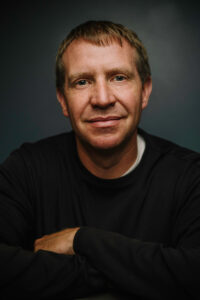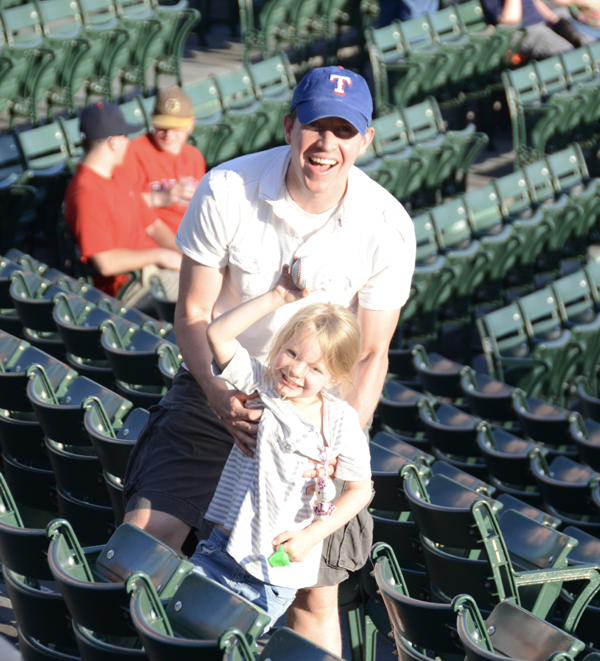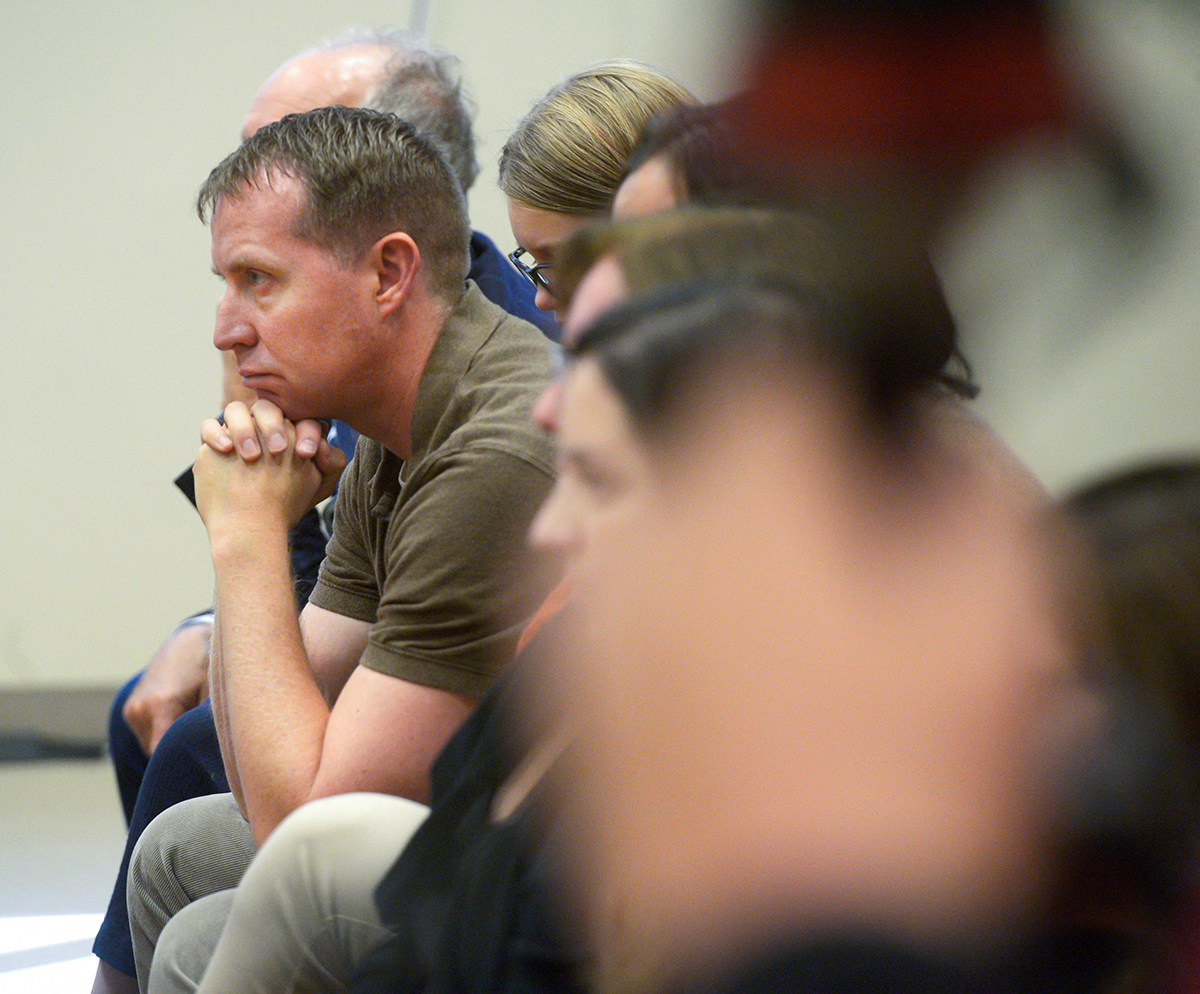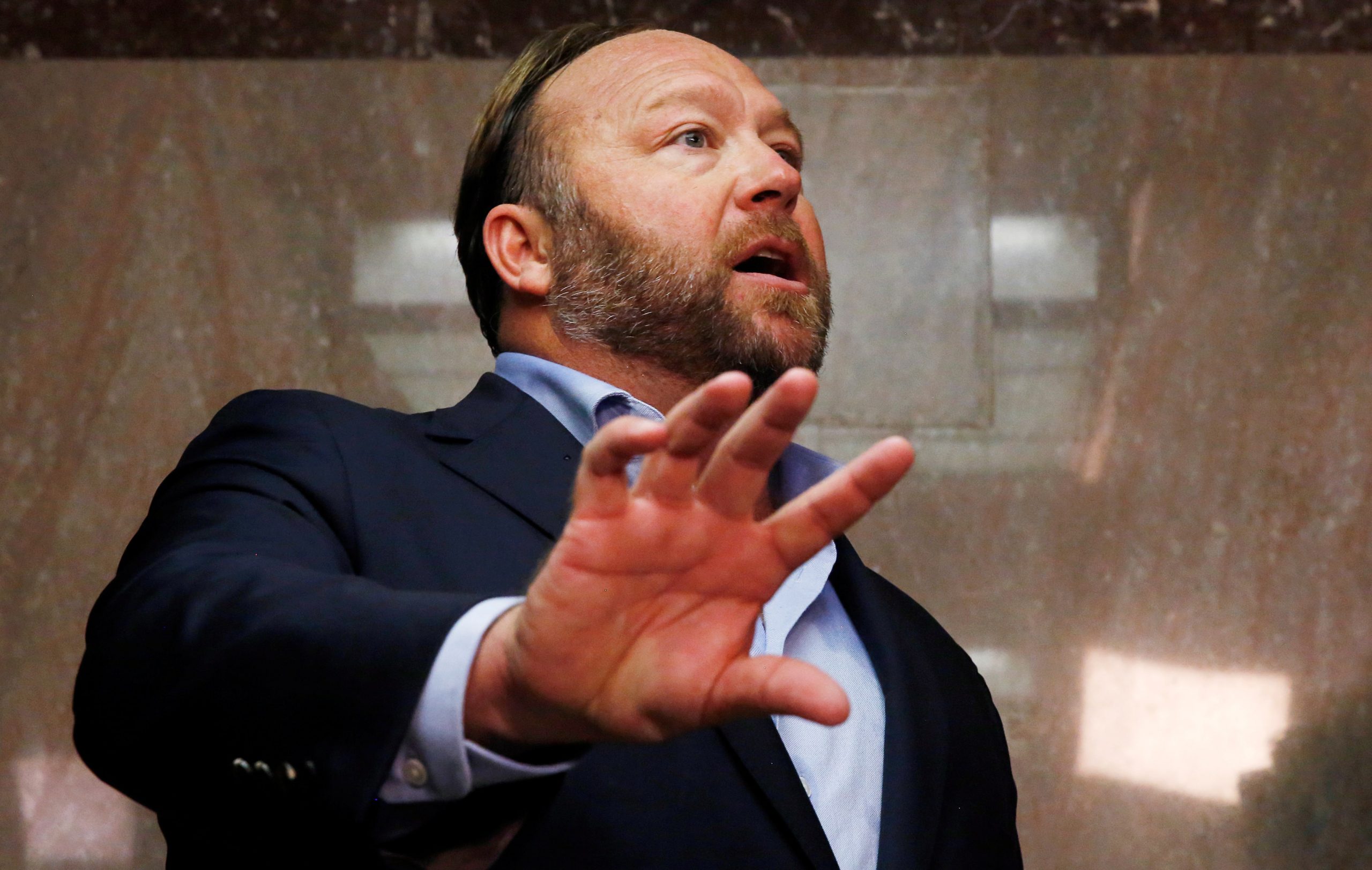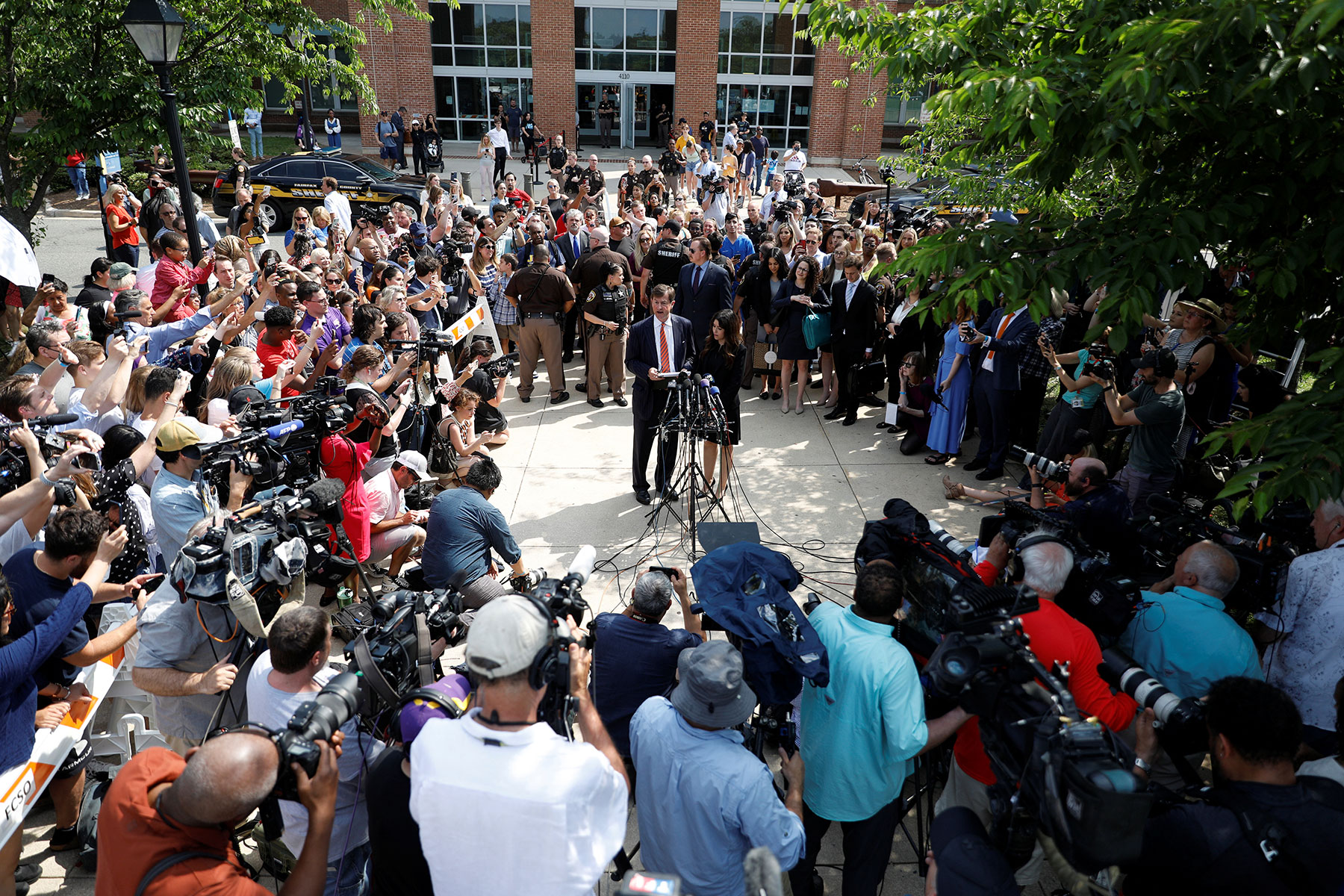Twelve years ago, a gunman killed 26 people at Sandy Hook Elementary School, 20 of them children in the first grade. That same day, conspiracy theorist Alex Jones told his followers that the shooting was a ploy to increase support for gun control.
Robbie Parker’s 6-year-old daughter Emilie was among those killed.
In November, Parker released his book “A Father’s Fight: Taking on Alex Jones and Reclaiming the Truth About Sandy Hook,” in which he recounted his family’s experience in grieving Emilie, and the actions that he and his wife Alissa — along with other families of Sandy Hook victims — took to combat Jones and his conspiracy platform Infowars.
Parker and other families endured more than a decade of harassment from Jones and his followers. Jones described the mass shooting as “staged,” “synthetic,” “manufactured,” “a giant hoax,” and “completely fake with actors.”
“Don’t ever think the globalists who hijacked this country wouldn’t stage something like this,” Jones said on Infowars the day of the shooting. “They kill little kids all day, every day.”
Sandy Hook families in both Connecticut and Texas sued Jones for defamation and intentional infliction of emotional distress. The First Amendment protects categories of false speech with some exceptions, such as defamation. Judges in both cases found Jones liable by default, a rare decision, due to his failure to comply with necessary discovery requests. In 2022, Jones was ordered to pay a total of $1.5 billion in damages. Parker was granted the largest award, with a combined total of $60 million in defamation and slander, both past and future, as well as emotional distress damages, past and future, for $60 million.
In his book, Parker described the day of the shooting, the weeks, months and years that followed, and his experience in the courtroom.
“That day in court, Jones proved that he was nothing more than a caged tiger, lashing out at the world because of his own fears and insecurities,” Parker writes in “A Father’s Fight.” “He may have had legions of loyal followers and tens of millions of dollars, but he possessed no love in his heart for himself — or for anyone else. He no longer had any power over me, as I recognized with pity that he was just a bitter, angry, scared and lonely, worn-out man.”
Jones filed for bankruptcy in 2022. As a result, he is required to sell off his personal assets to pay the debts he owes to the families, including his Infowars platform. The Onion, a satirical news outlet, had placed a bid on Infowars with monetary support from the Sandy Hook families with the goal of turning the platform into a parody. But, on Dec. 11, U.S. Bankruptcy Judge Christopher Lopez rejected The Onion’s purchase, citing problems in the auction process.
Parker, in an email to First Amendment Watch following the rejection of the sale, said he was “disappointed” with Judge Lopez’s decision and felt that “the sale of Infowars that the court-appointed trustee recommended was in the best interest of the creditors.”
“Though disappointed, when fighting with Alex Jones in over four years of litigation and two years in bankruptcy court, there have been many setbacks,” he wrote. “This is just another setback and doesn’t change the fact that at the end of the day he will still have to pay his debts to the Sandy Hook families because of the horrific lies and pain he’s inflicted.”
In an interview with First Amendment Watch, Parker discussed his book and his experience dealing with grief, how this book was important to his healing journey, and what he described as a lack of responsibility taken by social media platforms that spread potentially harmful conspiracy theories.
Editor’s note: This interview has been edited and condensed for length and clarity.
FAW: What were some of your motivations for writing this book?
Parker: That’s a harder question to answer than you might think. This wasn’t ever supposed to be seen by anybody. I started writing years ago, just trying to understand and process my own grief, and that was only meant to be for me, right? And it was surprising that, as I was writing about my grief, the aspect about the conspiracy theories and the impact it was having on me and my family, I purposely didn’t go there. I didn’t open that part of myself up, even to me. What I had been writing, I did share with some people, and they encouraged me to share it with others. And eventually an agent got a hold of some stuff that I had written, and she was really passionate about trying to get some things published in that I was writing about grief and trauma. But even she didn’t know about Alex Jones and the conspiracy theories and what I was dealing with, not until the trial. And even my agent was really surprised. She wasn’t angry, but she was like, “Why didn’t you ever tell me about this?” And I was like, “I don’t know. I just never really talked about it.” And so it was really going through the litigation, joining the lawsuit, going through the trial, is where I really feel like I found my voice, and that I felt I actually found what it was that I was actually trying to say, and in sharing that, found a lot of healing for myself, and when I shared it with other people, there were connections that were made, and I could see that there were bonds being formed, and healing was being brought to other people. And that’s eventually why I agreed to let it become a book.
FAW: Did you have any fear that you could be opening yourself back up to conspiracy theorists who may have otherwise moved on over the years?
Parker: Surprisingly, no. There was a lot of fear in me doing anything publicly for years, and there was a lot of fear in me joining the lawsuit. At the trial, and even in the book, I talk about my reasons for even joining the lawsuit. It was to provide a service for other families that were dealing with this. It was to show my daughters that I would fight for them just as much as I fought for Emilie, and to protect Emilie, and all those are very, very true. And those sound great, like those sound like very wonderful things to say. But at the heart of it was I needed to find my voice, and I needed to overcome my own fears, and I realized how much my fears have been holding me back. And so going through the trial, that was what I feel like I accomplished for myself. And so when it came time to actually write this book out and put it out there, I felt like I had overcome those fears and was ready for whatever came my way after that.
FAW: What sparked the idea of the families to take on Alex Jones together? Was someone familiar with the uses of defamation law to combat conspiracy theorists in this way?
Parker: I vaguely know. It’s funny to even ask that, because when I was writing the book, I was like, “Oh, I need to make sure I call Josh Koskoff and Chris Mattei and those guys and like, really get the full story about how this even came to pass.” And I ended up never doing that, because that wasn’t what the story needed to be about. But obviously the Texas plaintiffs, they filed first, and so they filed before the Connecticut lawsuit, even though both were kind of coming about at the same time from what I understand. The law firm was the same law firm that represented Sandy Hook families against Remington. And I believe, from what I understand, is the principal [of Sandy Hook Elementary] Dawn Hochsprung’s daughter, Erica, she was the one that first went to the law firm, and was like, “I want your help in dealing with the conspiracy people and with Alex Jones and stuff like that,” and Josh Koshkoff, the main lawyer at the firm, he even balked at it at first, and wasn’t really sure about it, and kind of took some persuading, and then I can’t remember what the catalyst was for him to finally agree to do it. And so that’s kind of how that got sparked. And some other families joined in. I was kind of out of the loop, since I wasn’t in Sandy Hook. My connection with the families had been diminished a little bit, not for anything bad or anything. I live on the other side of the country. And so I found out about it, and then I wrote about my process in joining the suit, but I had a lot of trust in the law firm. I saw what they were able to do with the Remington case. I spoke with Josh and with Matthew Blumenthal a number of times before actually making the decision to join. And so they made me feel very safe, and they earned a lot of trust.
FAW: You write: “The megaliths atop the social media empires who had much more to gain from Jones’s millions of followers and views, and quickly reconfirmed that my voice didn’t matter — as they consistently chose to protect his content on their platforms over the safety of my family.” What responsibility should social media platforms have in regulating content?
Parker: It’s really hard, and unfortunately, I don’t have a hard opinion about exactly where that line is. But what I feel really strongly about is, social media companies took on this responsibility, and it got way ahead of them before, I feel like, they knew what was going on, right? Things kind of just quickly moved along from what their original intentions and stuff were. But how I really feel about it is, they’re the ones that took on the responsibility of making sure that they create a safe space for people to come together and share, because that was the whole idea of social media, right? You come together, you connect with other people, you share ideas, and all that kind of stuff. And that sounds great. But they took on the responsibility to make sure that it’s safe. And so they ultimately fail at that, and continue to fail at that. And so where I feel like where we can force the responsibility on them is to hold them accountable when there are harmful things that are being done, and they know about it, and it’s been brought to their attention, and they choose to do nothing. And that was what happened in my case. And why, even though this book was about my healing journey and about the case, I needed to put what that Twitter representative said to me. He acknowledged at that Senate hearing, to me personally, not on the record, that they messed up, that they didn’t protect me, and that they were trying to do things better, and I needed to highlight that they only made the changes they did when it was widely known that they were complicit in this behavior. And so stepping up and shining a light on it, and making sure that if the legal system can’t hold them accountable, that the people that subscribe to their platforms want to hold them accountable to create a safe space, and that’s really what I feel like I can focus on where I feel I can make a difference. What’s astonishing to me is, I know that there’s a lot of content out there for them to monitor and all that kind of stuff, but they know, right? They’re writing algorithms to perpetuate these things, so they’re very aware of what’s going on, and they hide in the shadows, and they only seem to step into the light when they’re forced to. And so I just think this needs to make that spotlight bigger and wider, to make sure that they’re always aware of what their responsibilities are, and to protect the people that entrust them to create that safe space.
FAW: In your book you describe how, while testifying in court, former FBI agent Clint Watts analyzed the intent behind Alex Jones’ actions and the calculated business decisions that were made. How did you feel about that?
Parker: That happened in real time in the courtroom. I felt like I was really prepared for the trial to finally start. We’d been fighting this for years, and I was really hyped up for it, and I was not prepared for what was going to come, because I didn’t know how much I didn’t know. Clint Watts was just brilliant in the way he was able to put all the dots out there, how they’re connected, and it really took me up to this like 40,000-foot view of what the real problem was, because it was so close to me and right in my face, I couldn’t see farther than the tip of my nose. And so that was shocking to me in the trial to see how calculated and intentional and precise this was. It’s a very dangerous approach when you look at somebody like Alex Jones and [say] “He’s such a crazy guy, these conspiracy people are just crazy. They don’t know what they’re talking about.” That’s a very dangerous approach, because what you’re doing is, you’re creating the separation between you and what the problem is, and you do that because you don’t want to affiliate with these kinds of people. And you don’t want to admit that you’re vulnerable to them. And so you create this false sense of security, of like “they’re crazy, they’re dumb,” or whatever you want to say about them, and “they’re over there, and I’m over here,” and that allows what they do to continue to ferment and grow, and it’s a really dangerous approach. So I learned that in the trial. One of the most emotional days that Alissa and I had was when our lawyers were just talking about the steps that Jones took in that first week between the shooting on Friday, and Emilie’s funeral the following Saturday. So in that week, everything that transpired, step by step by step, and it was the first time I started to connect. Like, “Oh, Alex Jones did this on Tuesday. I remember what happened to me on Tuesday. I remember the things that I received, the messages I got, the steps that we had to take to protect ourselves, all because of that.” And it really just solidified, like I was saying, that it was intentional, it was malicious, it was calculated. And this wasn’t just some random dude out there spewing out a bunch of gibberish.

